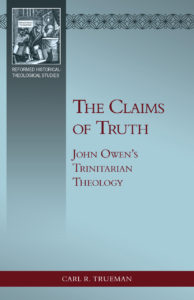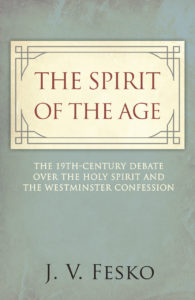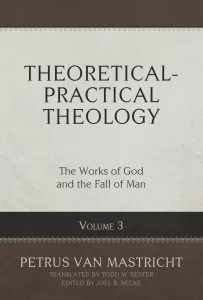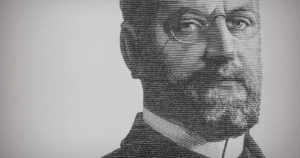
Author’s Corner
Each week on Credo we welcome you to join us in the Author’s Corner where we will meet a set of authors whose recent books deserve your attention and might even help you grow in your knowledge of theology, history, philosophy, and the scriptures. We hope the Author’s Corner can keep you up-to-date on the most important books published today and where you can find them.
On today’s Author’s Corner we present you with a selection of works from Reformation Heritage.
T he Claims of Truth: John Owen’s Trinitarian Theology (2021) by Carl R. Trueman
he Claims of Truth: John Owen’s Trinitarian Theology (2021) by Carl R. Trueman
Carl Trueman analyses the theology of the great Puritan theologian, John Owen, paying particular attention to his vigorous trinitarianism. To understand Owen, we need to see him as a seventeenth-century representative of the Western trinitarian and anti-Pelagian tradition. Trueman demonstrates how Owen used the theological insights of patristic, medieval, and Reformation theologians to meet the challenges posed to Reformed Orthodoxy by his contemporaries. A picture emerges of a theologian whose thought represented a critical reappropriation of aspects of the Western tradition for the purpose of developing a systematic restatement of Reformed theology capable of withstanding the assaults of both the subtly heterodox and the openly heretical.
T he Spirit of the Age: The 19th Century Debate Over the Holy Spirit and the Westminster Confession (2017) by J. V. Fesko
he Spirit of the Age: The 19th Century Debate Over the Holy Spirit and the Westminster Confession (2017) by J. V. Fesko
In 1903, the Presbyterian Church in the United States of America revised the Westminster Confession of Faith because they thought it was deficient regarding the Holy Spirit. In The Spirit of the Age, J. V. Fesko explores the differences between the pre-Enlightenment theology that formed the original Westminster Confession and the post-Enlightenment theology that called for its revision.
This study reveals that the pneumatology of the original Westminster Confession is marked by catholicity, whereas the revisions of 1903 represent a doctrine of the Holy Spirt that departed from the common Christianity of the ages. It also reveals that some of the underlying issues linked to the 1903 revisions are still alive today, even among Presbyterian fellowships that refused to adopt the twentieth-century revisions to the Westminster Confession.
T heoretical-Practical Theology, Volume 3: The Works of God and the Fall of Man (2021) by Petrus Van Mastricht
heoretical-Practical Theology, Volume 3: The Works of God and the Fall of Man (2021) by Petrus Van Mastricht
Volume 3, The Works of God and the Fall of Man, is a book of origins—origins of the created order and of sin. Mastricht begins with a discussion of the decrees of God and how they establish His eternal purpose for everything. He then shows how the decrees are carried out in creation and in God’s continual providence. The volume concludes with Mastricht’s treatment of the apostasy of Adam from his original estate and the devastating effects of sin that followed. This is an important volume for learning how God governs all things, even the rebellious actions of those good things He created.
Table of Contents:
Part 1 Continued: Prolegomena and Faith
Book 3: The Works of God
- The Actions and Decrees of God
- Predestination
- Election
- Reprobation
- Creation in General
- The World and the Work of the Six Days
- The Good Angels
- The Evil Angels
- Man and the Image of God
- The General Providence of God
- Special Providence
- The Covenant of Nature
Book 4: Man’s Apostasy from God
- The Violation of the Covenant of Nature
- Original Sin
- Actual Sin
- The Penalty and State of Sin

